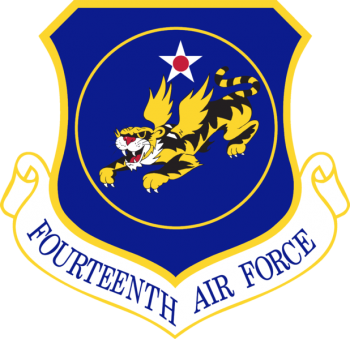14th Air Force, US Air Force
14TH AIR FORCE, US AIR FORCE
History: Established as Fourteenth Air Force on 5 March 1943. Activated on 10 March 1943. Inactivated on 6 January 1946. Activated on 24 May 1946. Discontinued and inactivated on 1 September 1960. Activated on 20 January 1966. Organized on 1 April 1966. Redesignated as Fourteenth Aerospace Force on 1 July 1968. Inactivated on 1 October 1976. Redesignated as Fourteenth Air Force (Reserve), and activated in the Reserve, on 8 October 1976. Redesignated as Fourteenth Air Force on 1 December 1985. Inactivated on 1 July 1993. Activated on 1 July 1993. Redesignated as: Fourteenth Air Force (Air Forces Strategic-Space) on 24 May 2007; Fourteenth Air Force (Air Forces Strategic) on 4 April 2008. President Roosevelt established Fourteenth Air Force by special order on 10 March 1943. Claire Chennault, who had formed the American Volunteer Group of "Flying Tiger" fame received a promotion to Major General and assumed command. The new organization, conducted highly effective fighter and bomber operations over Japanese occupied Chinese territory, and the eastern third of mainland China and Formosa. Fourteenth Air Force also supported the airlift of cargo over the Himalayas from India (flying the "The Hump") for Chinese forces and B-29 operations at forward operating bases in China during Operation MATTERHORN, October 1944 to Mar 1945. By August 1945, its components had achieved air superiority over the skies of China and established a ratio of 7.7 enemy planes destroyed for every American plane lost in combat. The United States Army Air Forces credited 14 AF units with the destruction of 2,315 Japanese aircraft, 356 bridges, 1,225 locomotives and 712 railroad cars. Following the war, it returned to the US and inactivated on 6 January 1946. In May of 1946, however, Fourteenth Air Force again activated at Orlando Army Air Base, FL, to administer Air Defense Command functions in Florida, Georgia, South Carolina, Tennessee, Alabama, Mississippi, Puerto Rico, Arkansas, Louisiana, Texas, Oklahoma and New Mexico. It supervised the air defense training of active duty units, Air National Guard and Air Force Reserve units. Continental Air Command later expanded its mission to include the equipping and combat preparation of these units. With the advent of the Korean War, the Fourteenth participated in the mobilization of Air National Guard and Air Force Reserve units and individuals from its headquarters at Robins AFB, GA. After the war, its reserve wings continued to participate in various worldwide airlift operations until inactivation in September 1960. In April 1966, the Air Force again activated the Fourteenth Air Force as part of Air Defense Command at Gunter AFB, AL, to support the North American Aerospace Defense Command Southern Region's air defense mission. Later, it provided for Aerospace Defense Command training, testing and evaluation missions. On 1 July 1968, Fourteenth Air Force was redesignated Fourteenth Aerospace Force and moved to Colorado Springs, CO. It assumed responsibility for detecting foreign missile launches, tracking missiles and satellites in space, providing space vehicle launch services, maintaining a satellite data base of all man-made objects in space and performing anti-satellite actions. It also equipped, trained, administered and provided personnel to operate and maintain space surveillance, space defense and missile warning systems until 1 October 1976 when it again inactivated. Seven days later, the Air Force redesignated the 14th Aerospace Force as Fourteenth Air Force (Reserve) at Dobbins AFB, GA, to manage airlift forces for the Military Airlift Command. Its units participated in worldwide airlift missions, one of which was Operation JUST CAUSE, December 1989-January 1990. In order to facilitate a change in mission, reassignment, and move to Vandenberg AFB, CA, the AF inactivated the Fourteenth at Dobbins AFB, GA, on 1 July 1993 and on the same day activated it in California. Assigned to Air Force Space Command, its responsibilities involved space operations. In 1997, it established the Space Operations Center at Vandenberg AFB in California for the 24-hour command and control of all space operations resources, and in 2002, became the Air Force's space operations component of the United States Strategic Command. As the Air Force's only Numbered Air Force for space and its concurrent United States Strategic Command mission of Joint Space Operations, the Fourteenth's mission included space launches from the east and west coasts, satellite command and control, missile warning, space surveillance and command and control of assigned and attached joint space forces. Its overall mission included control and exploitation of space for global and theater operations, to ensure warfighters the best space capabilities available.
| English | blazon wanted |
Origin/meaning
The Winged Tiger was the Emblem of the American Volunteer Air Group that fought in China during World War II. From this Unit the 14th Air Force was formed in 1943 at Kunming, China. The Emblem was approved on 6 August 1943; revised on 16 August 1994.
Literature:Image from Wikimedia Commons. Information from https://www.afhra.af.mil/
